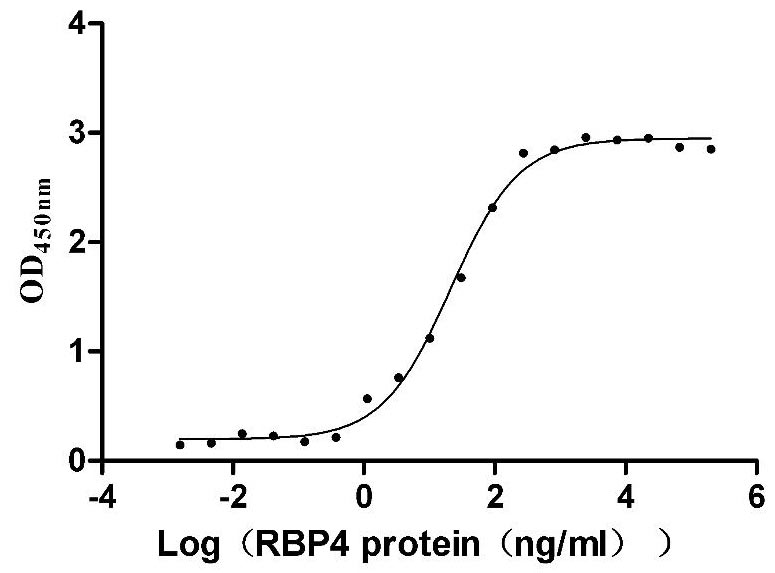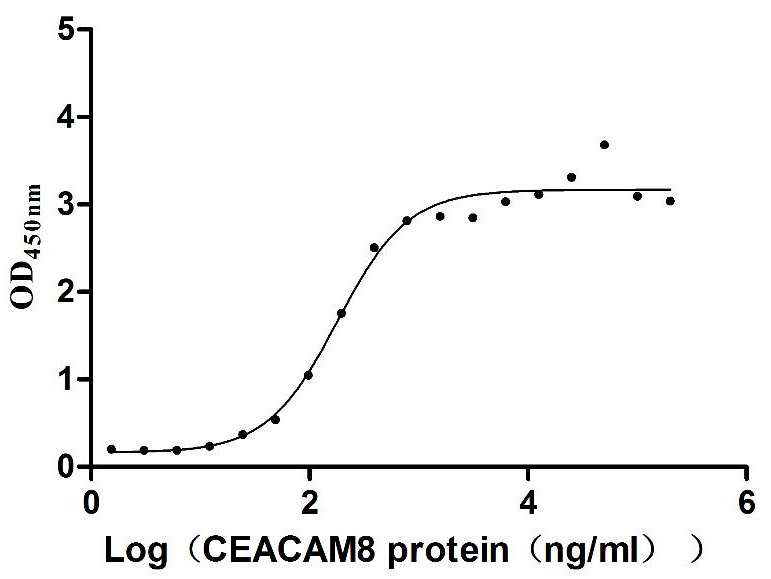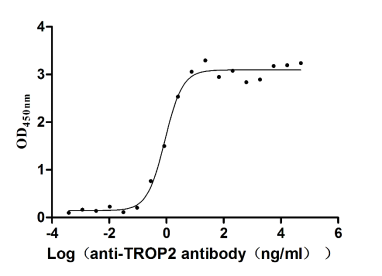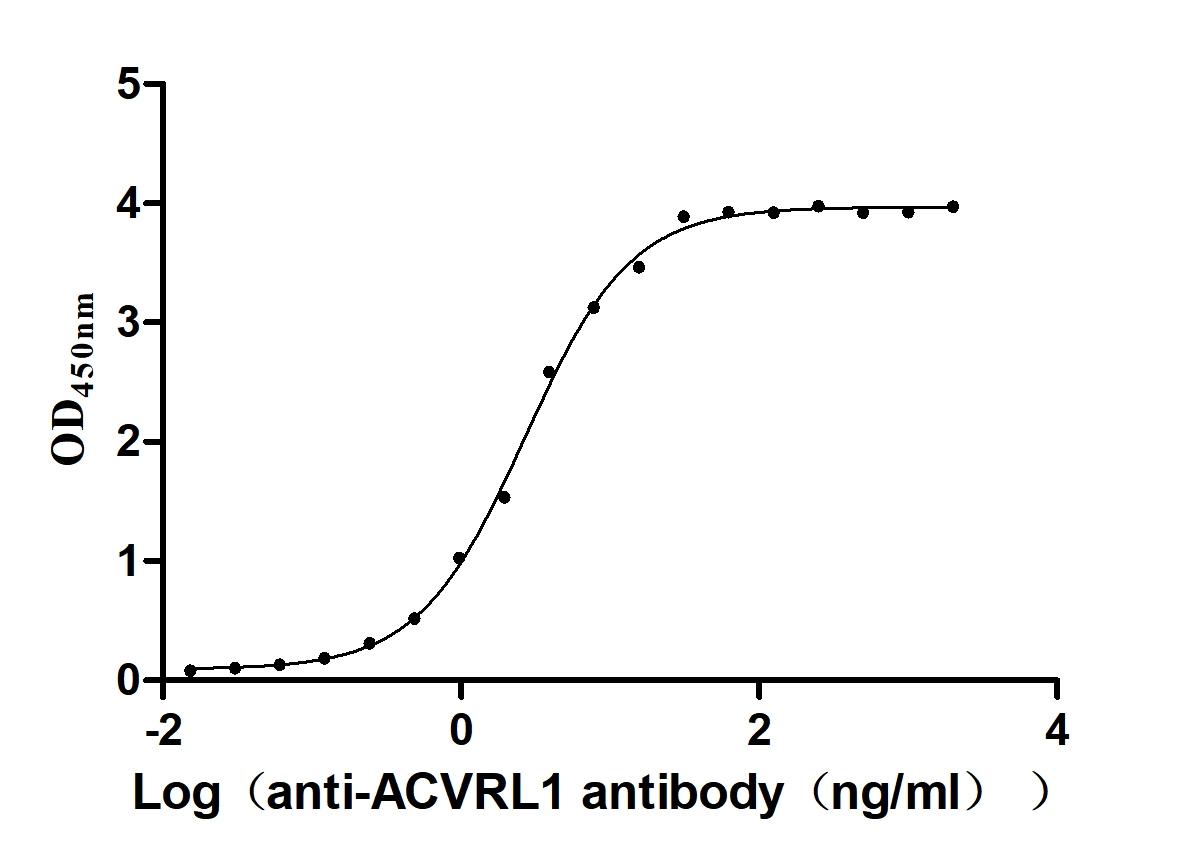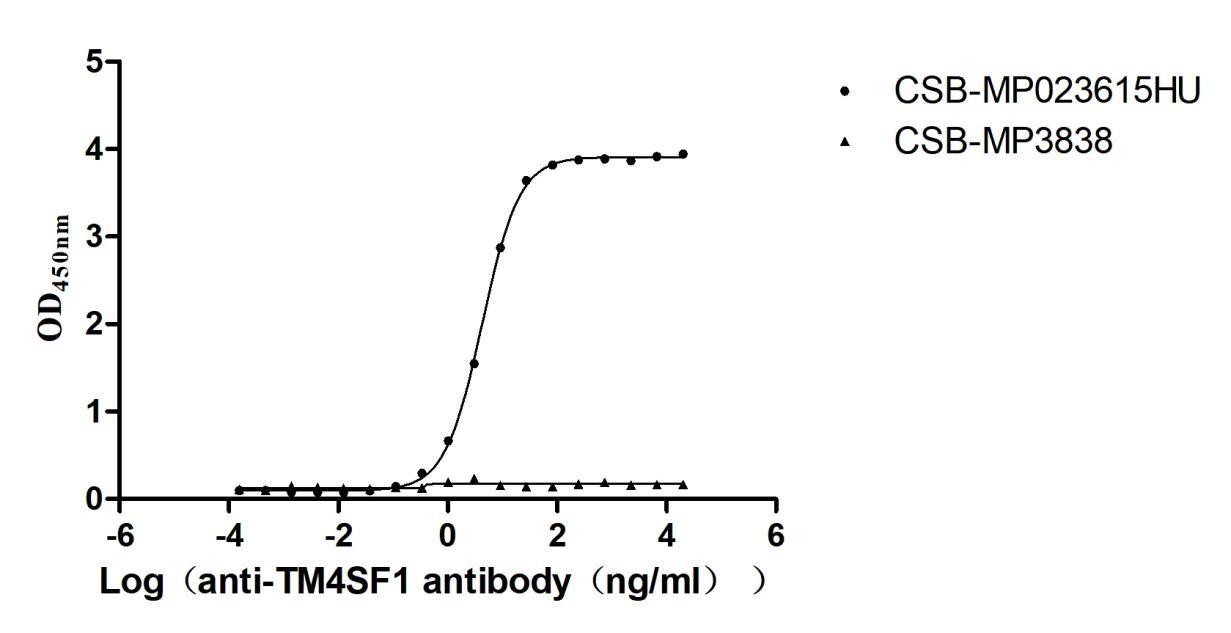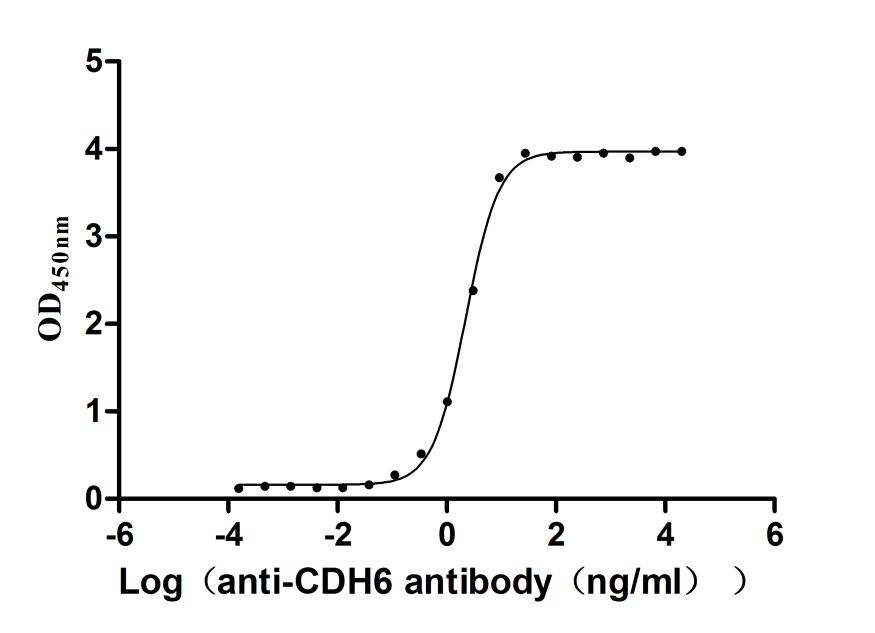Recombinant Mouse Tumor protein p73 (Tp73)
-
货号:CSB-YP024092MO
-
规格:
-
来源:Yeast
-
其他:
-
货号:CSB-EP024092MO
-
规格:
-
来源:E.coli
-
其他:
-
货号:CSB-EP024092MO-B
-
规格:
-
来源:E.coli
-
共轭:Avi-tag Biotinylated
E. coli biotin ligase (BirA) is highly specific in covalently attaching biotin to the 15 amino acid AviTag peptide. This recombinant protein was biotinylated in vivo by AviTag-BirA technology, which method is BriA catalyzes amide linkage between the biotin and the specific lysine of the AviTag.
-
其他:
-
货号:CSB-BP024092MO
-
规格:
-
来源:Baculovirus
-
其他:
-
货号:CSB-MP024092MO
-
规格:
-
来源:Mammalian cell
-
其他:
产品详情
-
纯度:>85% (SDS-PAGE)
-
基因名:
-
Uniprot No.:
-
别名:Tp73; P73; Trp73; Tumor protein p73; p53-like transcription factor; p53-related protein
-
种属:Mus musculus (Mouse)
-
蛋白长度:full length protein
-
表达区域:1-631
-
氨基酸序列MAQTSSSSSS TFEHLWSSLE PDSTYFDLPQ PSQGTSEASG SEESNMDVFH LQGMAQFNLL SSAMDQMGSR AAPASPYTPE HAASAPTHSP YAQPSSTFDT MSPAPVIPSN TDYPGPHHFE VTFQQSSTAK SATWTYSPLL KKLYCQIAKT CPIQIKVSTP PPPGTAIRAM PVYKKAEHVT DIVKRCPNHE LGRDFNEGQS APASHLIRVE GNNLAQYVDD PVTGRQSVVV PYEPPQVGTE FTTILYNFMC NSSCVGGMNR RPILVIITLE TRDGQVLGRR SFEGRICACP GRDRKADEDH YREQQALNES TTKNGAASKR AFKQSPPAIP ALGTNVKKRR HGDEDMFYMH VRGRENFEIL MKVKESLELM ELVPQPLVDS YRQQQQQQLL QRPSHLQPPS YGPVLSPMNK VHGGVNKLPS VNQLVGQPPP HSSAAGPNLG PMGSGMLNSH GHSMPANGEM NGGHSSQTMV SGSHCTPPPP YHADPSLVSF LTGLGCPNCI ECFTSQGLQS IYHLQNLTIE DLGALKVPDQ YRMTIWRGLQ DLKQSHDCGQ QLLRSSSNAA TISIGGSGEL QRQRVMEAVH FRVRHTITIP NRGGAGAVTG PDEWADFGFD LPDCKSRKQP IKEEFTETES H
-
蛋白标签:Tag type will be determined during the manufacturing process.
The tag type will be determined during production process. If you have specified tag type, please tell us and we will develop the specified tag preferentially. -
产品提供形式:Lyophilized powder
Note: We will preferentially ship the format that we have in stock, however, if you have any special requirement for the format, please remark your requirement when placing the order, we will prepare according to your demand. -
复溶:We recommend that this vial be briefly centrifuged prior to opening to bring the contents to the bottom. Please reconstitute protein in deionized sterile water to a concentration of 0.1-1.0 mg/mL.We recommend to add 5-50% of glycerol (final concentration) and aliquot for long-term storage at -20℃/-80℃. Our default final concentration of glycerol is 50%. Customers could use it as reference.
-
储存条件:Store at -20°C/-80°C upon receipt, aliquoting is necessary for mutiple use. Avoid repeated freeze-thaw cycles.
-
保质期:The shelf life is related to many factors, storage state, buffer ingredients, storage temperature and the stability of the protein itself.
Generally, the shelf life of liquid form is 6 months at -20°C/-80°C. The shelf life of lyophilized form is 12 months at -20°C/-80°C. -
货期:Delivery time may differ from different purchasing way or location, please kindly consult your local distributors for specific delivery time.Note: All of our proteins are default shipped with normal blue ice packs, if you request to ship with dry ice, please communicate with us in advance and extra fees will be charged.
-
注意事项:Repeated freezing and thawing is not recommended. Store working aliquots at 4°C for up to one week.
-
Datasheet :Please contact us to get it.
靶点详情
-
功能:Participates in the apoptotic response to DNA damage. Isoforms containing the transactivation domain are pro-apoptotic, isoforms lacking the domain are anti-apoptotic and block the function of p53 and transactivating p73 isoforms. May be a tumor suppressor protein.
-
基因功能参考文献:
- Data (including data from studies in knockout/transgenic mice) suggest Ppp2ca supports cortical neuronal growth and cognitive function via regulating p73/Gls2 signal transduction in neurons of hippocampus. Ppp2ca gene knock-out results in embryonic cortical atrophy with learning/memory deficits. (Ppp2ca = protein phosphatase 2a catalytic subunit alpha isoform; p73 = transformation related protein 73; Gls2 = glutaminase-2) PMID: 29274472
- p73 is required for appropriate BMP-induced mesenchymal-to-epithelial transition during somatic cell reprogramming. PMID: 28880267
- P73 role in differentiating stem cells.RASSF1A promotes a YAP-p73 transcriptional programme that enables differentiation. PMID: 29382819
- Absence of TAp73 leads to activation of TGF-beta signaling through a Sma and Mad-related proteins-independent pathway, favoring oncogenic transforming growth factor-beta effects and epithelial-to-mesenchymal transition. PMID: 26943320
- Findings reinforce the role of TAp73 as tumor suppressor gene and indicate that the regulation of cellular metabolism by TAp73 contributes to its tumor suppressor function. PMID: 27119504
- New function of p73, independent of p53, in the neurogenic architecture of the SVZ of rodent brain. PMID: 26482843
- TAp73 as necessary and sufficient for basal body docking, axonemal extension, and motility during the differentiation of Motile multiciliated cell progenitors. PMID: 27257214
- p73 drives multiciliogenesis, both through transcriptional activation of a master ciliogenesis transcription factor FoxJ1 and through regulation of multiple genes central to ciliogenesis. PMID: 26988441
- The p73 acts as a critical regulator of multiciliogenesis in its capacity as a sequence-specific transcription factor, through genomic binding and regulation of genes. PMID: 26947080
- Results indicate that p73 regulates basal and starvation-induced fuel metabolism in the liver, a finding that is likely to be highly relevant for metabolism-associated disorders, such as diabetes and cancer. PMID: 26375672
- MDM2 mediates p73 ubiquitination PMID: 26025930
- p73 is required for endothelial cell differentiation, migration and the formation of vascular networks regulating VEGF and TGFbeta signaling PMID: 25571973
- Ribosomal proteins L11 and L5 activate TAp73 by overcoming MDM2 inhibition. PMID: 25301064
- the p73 status has to be considered when studying the regulatory role of p53 protein in gliomagenesis [review] PMID: 24742294
- Suggest that TAp73 promotes anabolism to counteract cellular senescence rather than to support proliferation. PMID: 25554796
- Inhibition of TAp73 results in an accumulation of HIF-1alpha and up-regulation of HIF-1alpha target genes. PMID: 25535357
- The transcription factor TAp73 opposes HIF-1 activity through a nontranscriptional mechanism, thus affecting tumor angiogenesis. PMID: 25535359
- findings show p73 is involved in a variety of CNS activities ranging from embryonic regulation of brain size to the control of cerebrospinal fluid homeostasis in the adult brain via maintenance of the ependyma PMID: 24500610
- TAp73 ensures fertility by enabling sperm maturation. PMID: 24662569
- TAp73 has a unique role in spermatogenesis. PMID: 24449892
- TRIM32 physically interacts with TAp73 and promotes its ubiquitination and degradation while TAp73 regulates TRIM32 gene expression. PMID: 23828567
- TAp73 is a transcriptional activator of the p75 neurotrophin receptor. PMID: 24190996
- Our results fail to support P73 as a contributor to Alzheimer's disease pathogenesis. PMID: 23414597
- Report p73 and tyrosine hydroxylase levels in an in vitro model of Parkinson disease. PMID: 23271007
- The knockdown of endogenous p73 by siRNA effectively blocks RanBP9 and Abeta1-42-induced mitochondria-mediated cell death. PMID: 23348590
- the depletion of tp73 protein in macrophage exhibited elevated production of TBFalpha, IL-6 and macrophage inflammatory protein-2 as well as prolonged survival, decreased phagocytosis and increased major histocompatibility complex class II expression. PMID: 22976836
- Bone marrow stromal cell transplantation retards Alzheimer's disease-like pathology and upregulates deltaNp73 expression in hippocampuses of amyloid peptide precursor/PS1 transgenic mice. PMID: 22196765
- knockdown of p73 or p21, another target of RNPC1, attenuates the inhibitory effect of RNPC1 on cell proliferation and premature senescence, whereas combined knockdown of p73 and p21 completely abolishes it PMID: 22508983
- Report expression of TP73 isoforms in mouse tissues. PMID: 22388545
- This study provides evidence that the ubiquitination of p73 mediated by Pirh2 represents an important pathway for controlling the suppressive function of p73 PMID: 21994467
- Study indicates that tight transcriptional and post-translational mechanisms regulate the p73 isoform ratios that play an important role in neuronal survival. PMID: 22002055
- Neuronal differentiation by TAp73 is mediated by microRNA-34a regulation of synaptic protein targets. PMID: 22160687
- study supports the concept that p63 and p73 functions are each highly specific for different subsets of organogenesis within the body; while p63 drives morphogenesis in striated epithelia, p73 is a key driver of central nervous system organogenesis. PMID: 21293190
- p73 is the unique p53 homolog essential for brain development. Loss of p73 function in mice reduces the neural stem and progenitor compartment by approximately 50%. PMID: 21441779
- p73 has a role in regulating neural progenitor cell self-renewel through the regulation of cell differentiation. PMID: 21368881
- TAp73 induction by nitric oxide: regulation by checkpoint kinase 1 (CHK1) and protection against apoptosis. PMID: 21212274
- This study suggested that p3 is not essential for brain development and Cajal-Retzius cell formation and present in cell PMID: 21114965
- p73 ensures normal adult neurogenesis by promoting the long-term maintenance of neural stem cells. PMID: 21074438
- The p73 has a critical role in maintaining an adequate neurogenic pool by promoting self-renewal and proliferation and inhibiting premature senescence of neural stem and early progenitor cells. PMID: 21076477
- These data suggest that p73, and in particular TAp73, is important for maintenance of the neural stem cells pool. PMID: 20977890
- results demonstrate a pathway for survival of activated T cells through NF-kappaB-induced Mdm2, which blocks Bim-dependent apoptosis through binding and inhibition of p73 PMID: 20921405
- p53-independent up-regulated modulator of apoptosis (PUMA) protein activation is mediated by p53-related protein TAp73. PMID: 20477944
- In primary ovarian carcinomas, ZEB1 binding site methylation and TAp73 expression correlate with BRCA1 status and with clinical response. PMID: 20807817
- PIR2, by being induced by TAp73 and degrading DeltaNp73, differentially regulates TAp73/DeltaNp73 stability. PMID: 20615966
- p73 is activated after genotoxin treatment only in the presence of NF-kappaB and p73 induces Noxa gene expression through the p53 element in the promoter. PMID: 20195489
- These data together demonstrate the existence of a c-Jun-dependent mechanism regulating the abundance of the antiapoptotic DNp73 in response to genotoxic stress. PMID: 20185758
- tumor suppressive properties of p73 are highly dependent on cellular context, wherein p73 plays a major role in T cell development and neoplasia PMID: 19907659
- DeltaNp73 localizes directly to the site of DNA damage, can interact with the DNA damage sensor protein 53BP1, and inhibits ATM activation and subsequent p53 phosphorylation PMID: 20194434
- Expression of the beta 4 subunit of the alpha 6 beta 4 integrin induces monocytic differentiation of 32D/v-Abl transformed cells. alpha 6 beta 4 integrin promotes growth arrest and differentiation by modulating Abl kinases and p73 protein pathway(s). PMID: 12070014
- p73 binds to NF-Y and transcriptionally regulates platelet derived growth factor beta receptor PMID: 12167641
显示更多
收起更多
-
亚细胞定位:Nucleus. Cytoplasm.
-
蛋白家族:P53 family
-
组织特异性:Found in striatal neurons of mutant huntingtin (htt) transgenic mice (at protein level). Isoform 1 is expressed in the nasal epithelium, the vomeronasal organ, the hippocampus and the hypothalamus.
-
数据库链接:
KEGG: mmu:22062
STRING: 10090.ENSMUSP00000101269
UniGene: Mm.78015
Most popular with customers
-
Recombinant Human Membrane cofactor protein (CD46), partial (Active)
Express system: Mammalian cell
Species: Homo sapiens (Human)
-
Recombinant Mouse Transthyretin (Ttr) (Active)
Express system: Mammalian cell
Species: Mus musculus (Mouse)
-
Recombinant Human Carcinoembryonic antigen-related cell adhesion molecule 6 (CEACAM6) (Active)
Express system: Mammalian cell
Species: Homo sapiens (Human)
-
Recombinant Human Tumor-associated calcium signal transducer 2 (TACSTD2), partial (Active)
Express system: Mammalian cell
Species: Homo sapiens (Human)
-
Recombinant Human Serine/threonine-protein kinase receptor R3 (ACVRL1), partial (Active)
Express system: Baculovirus
Species: Homo sapiens (Human)
-
Recombinant Human Myosin regulatory light chain 12A (MYL12A) (Active)
Express system: E.coli
Species: Homo sapiens (Human)
-
Recombinant Human Transmembrane 4 L6 family member 1(TM4SF1)-VLPs (Active)
Express system: Mammalian cell
Species: Homo sapiens (Human)
-
Recombinant Macaca fascicularis Cadherin 6(CDH6),partial (Active)
Express system: Mammalian cell
Species: Macaca fascicularis (Crab-eating macaque) (Cynomolgus monkey)



